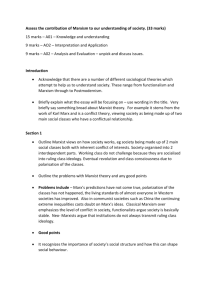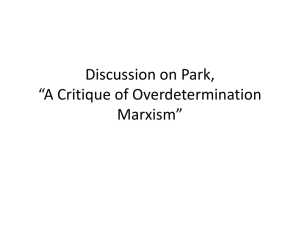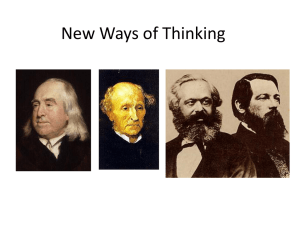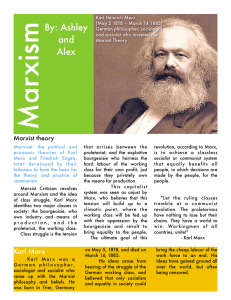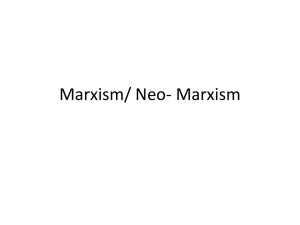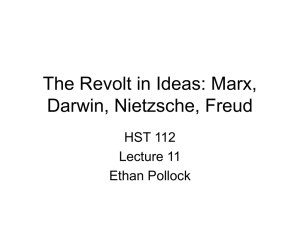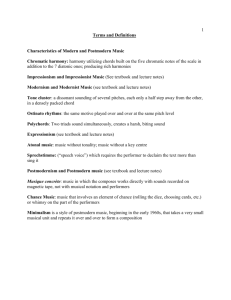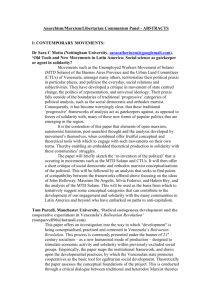Rethinking Marxism - Heterodox Economics Newsletter
advertisement
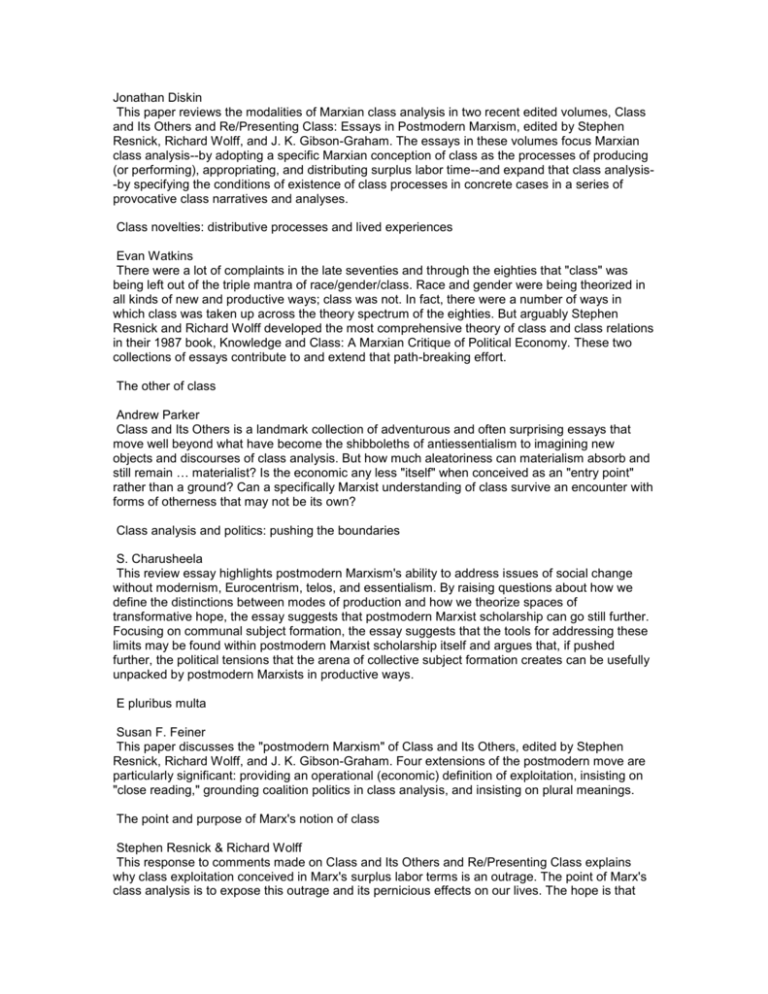
Jonathan Diskin This paper reviews the modalities of Marxian class analysis in two recent edited volumes, Class and Its Others and Re/Presenting Class: Essays in Postmodern Marxism, edited by Stephen Resnick, Richard Wolff, and J. K. Gibson-Graham. The essays in these volumes focus Marxian class analysis--by adopting a specific Marxian conception of class as the processes of producing (or performing), appropriating, and distributing surplus labor time--and expand that class analysis-by specifying the conditions of existence of class processes in concrete cases in a series of provocative class narratives and analyses. Class novelties: distributive processes and lived experiences Evan Watkins There were a lot of complaints in the late seventies and through the eighties that "class" was being left out of the triple mantra of race/gender/class. Race and gender were being theorized in all kinds of new and productive ways; class was not. In fact, there were a number of ways in which class was taken up across the theory spectrum of the eighties. But arguably Stephen Resnick and Richard Wolff developed the most comprehensive theory of class and class relations in their 1987 book, Knowledge and Class: A Marxian Critique of Political Economy. These two collections of essays contribute to and extend that path-breaking effort. The other of class Andrew Parker Class and Its Others is a landmark collection of adventurous and often surprising essays that move well beyond what have become the shibboleths of antiessentialism to imagining new objects and discourses of class analysis. But how much aleatoriness can materialism absorb and still remain … materialist? Is the economic any less "itself" when conceived as an "entry point" rather than a ground? Can a specifically Marxist understanding of class survive an encounter with forms of otherness that may not be its own? Class analysis and politics: pushing the boundaries S. Charusheela This review essay highlights postmodern Marxism's ability to address issues of social change without modernism, Eurocentrism, telos, and essentialism. By raising questions about how we define the distinctions between modes of production and how we theorize spaces of transformative hope, the essay suggests that postmodern Marxist scholarship can go still further. Focusing on communal subject formation, the essay suggests that the tools for addressing these limits may be found within postmodern Marxist scholarship itself and argues that, if pushed further, the political tensions that the arena of collective subject formation creates can be usefully unpacked by postmodern Marxists in productive ways. E pluribus multa Susan F. Feiner This paper discusses the "postmodern Marxism" of Class and Its Others, edited by Stephen Resnick, Richard Wolff, and J. K. Gibson-Graham. Four extensions of the postmodern move are particularly significant: providing an operational (economic) definition of exploitation, insisting on "close reading," grounding coalition politics in class analysis, and insisting on plural meanings. The point and purpose of Marx's notion of class Stephen Resnick & Richard Wolff This response to comments made on Class and Its Others and Re/Presenting Class explains why class exploitation conceived in Marx's surplus labor terms is an outrage. The point of Marx's class analysis is to expose this outrage and its pernicious effects on our lives. The hope is that the resulting awareness will motivate us to eliminate it from our lives, much like any other socially recognized disease or crime. Working for that elimination is a new kind of politics, one aimed squarely at placing workers who produced the surplus in the position to collectively appropriate it. Dilemmas of theorizing class J. K. Gibson-graham Pushed by our reviewers to revisit perennial (meta)theoretical questions and choices, we confront once again the dilemmas of theorizing. Should we emphasize the emptiness or fullness of categories? What historical baggage comes with our theoretical categories and what violence does theory do to history and geography? Must we sacrifice the heterogeneity within categories to constitute differences between them? Can a category function simultaneously as a ground and a product of analysis? Is there a virtue in consistency? Should theory identify limits or explore possibilities, or should it always do both? What constitutes a broadening of the theoretical imagination? ALSO IN THIS ISSUE: Why I left Alan Greenspan to seek economic significance: the confessions of an a-male Stephen T. Ziliak If progressive economists are serious about changing what is valued in the economics research paper--and therefore in real-world decisionmaking in courts and hospitals and the World Bank-they should insist in their own research journals that current usage of statistical significance has no theoretical justification. If Marxist journals hurry up and change their ways they can beat to the punch the most prestigious journal of economics in the world, the American Economic Review, which, this paper shows, is filled with reports of statistical significance but not with reports of what we really want, economic or substantive significance. In empirical economics size, not fit, is what matters, but the mainstream comes up short. Likewise, testing for fit but not size is hurting Marxist analysis and the world. People standing for jobs and justice and human lives should do better. No size, we should say, no significance. Gender and Marx's radical humanism in the economic and philosophic manuscripts of 1844 Judith Grant Marx speaks of "human" as a starting point for his discussion of infinite variability, mutability, and differences among human beings. In this article, I unpack Marx's notion of "species-being" in order to establish Marx's idea about the historical nature of human beings. I then go on to show how Marx viewed the male/female relation as an indicator of the development of a nonanimalistic human. I conclude by showing how Marxian humanism is radically socially constructivist yet is allied with an active political "subject." I conclude by showing how Marxian humanism can benefit feminist and queer theories. Sans vue (or: How I learned to stop worrying and love the media) Rene Gabri & Richard Gabri Rene Gabri and Richard Gabri, armed with the insights of Paul Virilio concerning the 4th Front, present readers with the intellectual process and material they have been using to produce their video, ‘‘Sans Vue.’’ What they offer us in these pages is an active engagement/an approach that encourages various modes of reading, writing, or viewing the television coverage of the war --so that we can join them in understanding how the media and the war have been represented in each other. Gabri and Gabri are even more intent on constructing the mechanisms and tools of resistance and critique in order to struggle for a ‘‘media to come,’’ which will not so readily bow down to and serve the goals of empire. On Althusser's immanentist structuralism: reading Montag reading Althusser reading Spinoza Giorgos Fourtounis This article investigates the way in which the Althusserian notions of structure and structural causality, elaborated in his early work and especially in Reading Capital, are constructed on the basis of the Spinozist concept of immanent causality. In particular, it argues that this construction necessarily involves a novel, radical conception of the whole, an "immanent holism," opposing the two complementary, traditional conceptions of the whole, the atomistic and the transcendent. Further, this novelty is the counterpart of a necessary, constitutive tension of the notion in question. Whipping boy or ally? rethinking Dewey on education and capitalism Masato Aoki This article facilitates allied Marxist-pragmatist investigation of class/education interactions by analyzing the methodological and thematic compatibility between postmodern Marxism (overdetermination, contradiction, surplus-labor concept of class) and antifoundationalist Deweyan pragmatism (reflexive experience, contextualist metaphysics, reorganizing experience). The article traces Marxism's historical antagonism toward pragmatism to traditional Marxism's structuralist and humanist tendencies; describes postmodern Marxism's antiessentialist method; interprets Deweyan pragmatism, emphasizing its antifoundationalist ontological stance; and reframes Dewey's support of capitalism within pragmatism's radical openness and rejection of developmental endpoints. The article suggests lines of inquiry that could be jointly pursued in an ongoing critical discourse between postmodern Marxism and pragmatism. Remarx Jonathan Scott This essay is a criticism of the prevailing theory of multiculturalism. It focuses on the absence in the discourse of multiculturalism of the "white identity," in particular the history of white racial oppression in U.S. society and how this system of social control continues to block a classstruggle approach to diversity and difference. An alternative theory of multiculturalism is proposed through the "hip-hop nation." The argument is that an authentic form of multiculturalism, embodied by hip-hop music and culure, has existed for more than twenty years, yet the official discourse of multiculturalism has ignored its possibilities for expanding multiculturalism and deepening its base. A "white blindspot" in multiculturalism appears to be responsible for this omission. Reviews Boone Shear reviews Pem Davidson Buck’s Worked to the Bone: Race, Class, and Privilege in Kentucky, which traces the effects of race and its conflation with class in consolidating elite power in U.S. history. Shear’s conclusion is that Buck has devised ‘‘an elegantly simple model’’ that shows both how the system works and how future transformations are possible. In the second review, Clifford Staples is less convinced that Andrew Levine’s book, A Future for Marxism? Althusser, the Analytical Turn, and the Revival of Socialist Theory, represents a way forward. Staples faults Levine for dismissing both the relevance of the New Left (because it failed to appreciate the disappearance of the proletariat and, with it, a revolutionary subject) and Althusser’s contributions to Marxism (siding, instead, with the work of the Analytical Marxists).
